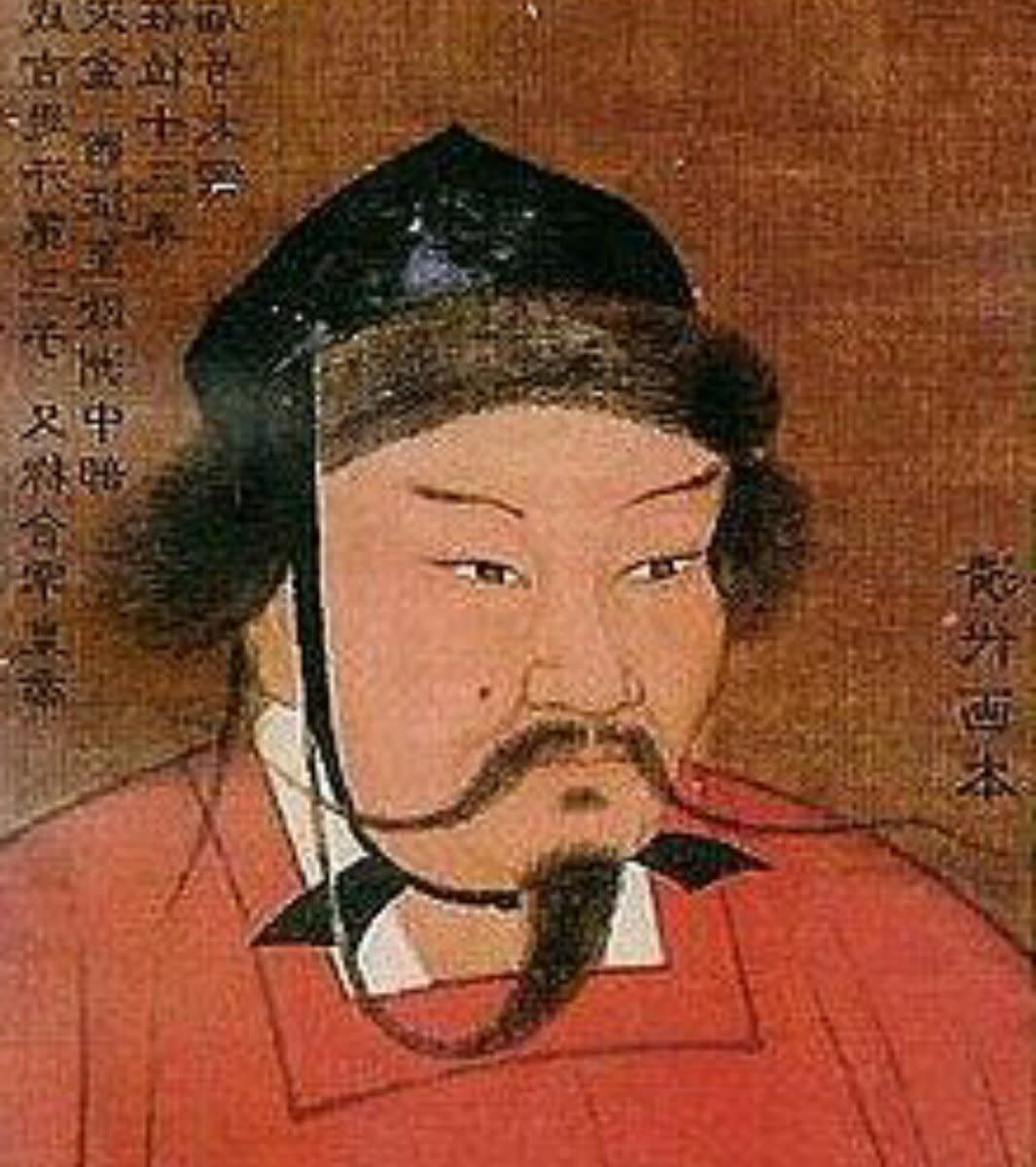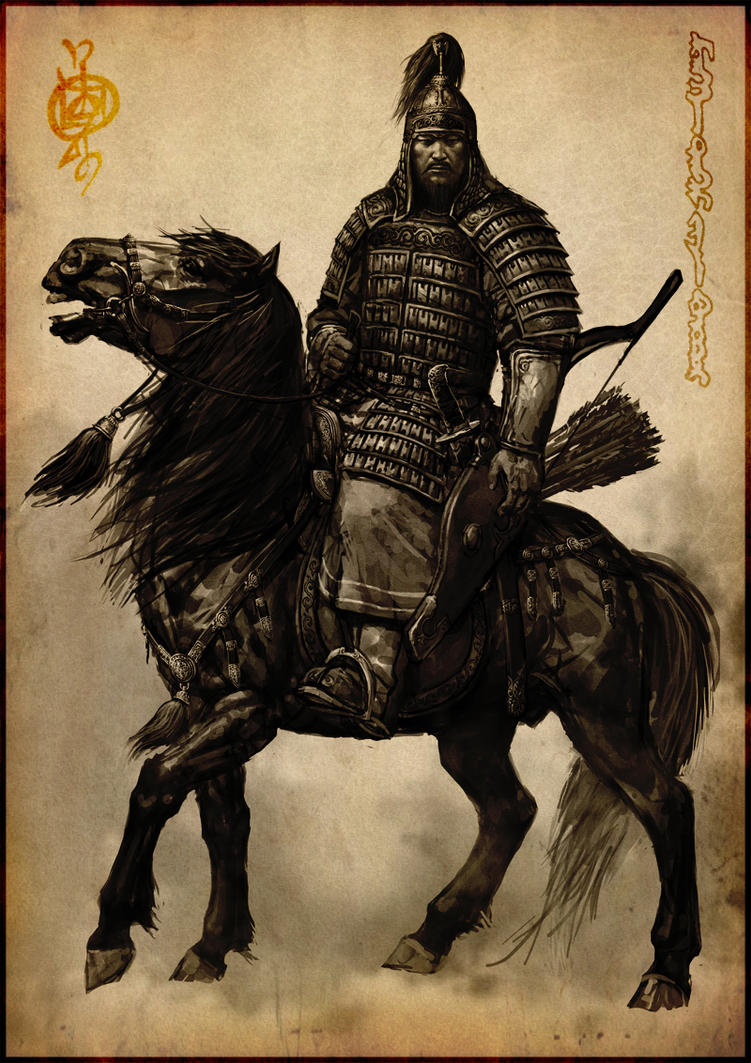
Khublai Khan of Yuan China Character Concept, Character Art, Character
The Rise of Kublai Khan and the the Mongol Invasions of China. Genghis Khan united the Mongol and Turkic tribes of the steppes and became Great Khan in 1206. He and his successors expanded the Mongol Empire across Asia. Under the reign of Genghis's third son, Ögedei Khan, the Mongols destroyed the weakened Jin dynasty in 1234, conquering.

Kublai Khan on the hunt Kublai khan, Historical warriors, Genghis khan
In 1271, Kublai Khan defeated the Song Dynasty and declared himself the first emperor of China's Yuan Dynasty. A grandson of Genghis Khan, he ruled over much of China plus Mongolia and Korea; meanwhile, his uncles and cousins controlled an empire that stretched from Hungary in the west to the Pacific coast of Siberia in the east.

INNER MONGOLIA, CHINA 10 De Agosto De 2015 Kublai Khan Statue En El
Kublai Khan (1215-1294) was the greatest of the Mongol emperors after Genghis Khan and founder of the Yüan dynasty in China. Though basically a nomad, he was able to rule a vast empire of different nations by adapting their traditions to his own government. Genghis Khan was succeeded by his third son Ögödei (1229-1241); after Ögödei's.

Marco Polo Kublai Khan Marco polo netflix, Kublai khan, Marco polo
Ultimately, under Kublai Khan, the Mongols were the first non-Chinese people to conquer all of China. However, their conquests of Japan and Java failed. At the time of Kublai's death, the Mongol Empire fractured into four separate empires; this made it easy for the Han Chinese to overthrow them in 1368 and establish the Ming Dynasty.
/painting-of-kublai-khan--urumqi--xinjiang-province--silk-road--china-528749802-59d534e76f53ba0010a89197.jpg)
Biography of Kublai Khan, Ruler of Mongolia and China
Site of Xanadu Site of Xanadu North of the Great Wall, the Site of Xanadu encompasses the remains of Kublai Khan's legendary capital city, designed by the Mongol ruler's Chinese advisor Liu Bingzhdong in 1256. Over a surface area of 25,000 ha, the site was a unique attempt to assimilate the nomadic Mongolian and Han Chinese cultures.

kublai khan portrait Ancient chinese art, Chinese artwork, Chinese art
Kublai Khan (Qubilai-Qan) was the ruler of the Mongol Empire from 1260 to 1294. His accomplishments include establishing Mongol rule in China under the name of the Yuan Dynasty (1271-1368), thus becoming the first non-Chinese to rule the whole of that country.

The Mongol Empire Kublai Khan's Impact on China Owlcation
Kublai Khan [note 4] (23 September 1215 - 18 February 1294), also known by his temple name as the Emperor Shizu of Yuan and his regnal name Setsen Khan, was the founder and first emperor of the Yuan dynasty of China and the fifth khagan - emperor [note 1] of the Mongol Empire from 1260 to 1294, although after the division of the empire this was.

Kublai Khan Statue at Site of Xanadu (World Heritage Site). a Famous
Kublai Khan was the grandson of Genghis Khan, the founder of the Mongol Empire. To the Chinese people of that time, the Mongols, who enjoyed a way of life that was much different from theirs, were viewed as uncivilized barbarians. Yet, Kublai Khan is remembered in history as a wise ruler. The Chinese too view him in a generally positive light.

Kublai Khan Mongol Warrior, Horseman, Hunter and Powerful Emperor
Kublai Khan - Mongol Empire, China, Conqueror: Though Kublai was celebrated above all as a Chinese emperor, he also helped to form the political traditions of his own Mongol people.

Kublai Khan Biography The Mongol Empire YouTube
Kublai Khan is considered to be one of the greatest of the Mongol rulers — and initially because it appeared he had broken his grandfather's legacy of conquering through force. He was the catalyst for many advancements both social and scientific and was considered a diplomatic Mongol.

Kublai Khan Statue at Site of Xanadu (World Heritage Site). a Famous
Kublai Khan was the grandson of Genghis Khan, founder and first ruler of the Mongol Empire, which, at the time of Kublai's birth in Mongolia on September 23, 1215, stretched from the.

Pin on Mystery of History 2
Kublai Khan (September 23, 1215-February 18, 1294) was a Mongol emperor who founded the Yuan Dynasty in China. He was the most famous grandson of the great conqueror Genghis Khan, expanding his grandfather's empire and ruling the vast territory. He was the first non-Han emperor to conquer all of China. Fast Fact: Kublai Khan

la Memoria del Viento Kublai Khan
Article Vocabulary Kublai Khan was born in 1215, during the reign of his grandfather, the Mongol Emperor Genghis Khan. As a young boy, Kublai was taught the art of warfare and became a skilled warrior and hunter. He also was exposed to many elements of Chinese culture, which he grew to admire.

MONGOLIA INTERNA, CINA 10 Agosto 2015 Kublai Khan Statue Al Sito
In the 13th Century, no-one knew how big the world was so it was not so wild for the Mongols to set off from the grassland with the idea that they were going to conquer all of it. When the mighty.

INNER MONGOLIA, CHINA Aug 10 2015 Kublai Khan Statue At Kublai
Kublai Khan Biography. Born: 1215. Mongolia. Died: February 1294. Ta-tu (Peking), China. Mongolian emperor. Kublai Khan was the greatest of the Mongol emperors after Genghis Khan and founder of the Yüan Dynasty in China. He was a wise ruler and was able to lead a vast empire of nations by adapting different traditions to his own government.

Fancy That (With images) Genghis khan, Kublai khan, Khan
The Mongols had already sucked half of China and Korea into their huge empire, and their leader Kublai Khan now set his sights on Japan. Kublai was the grandson of Genghis Khan and had founded the Yuan dynasty of China (1271-1368 CE) with his capital at Dadu (Beijing), but just why he now wanted to include Japan in his empire is unclear.